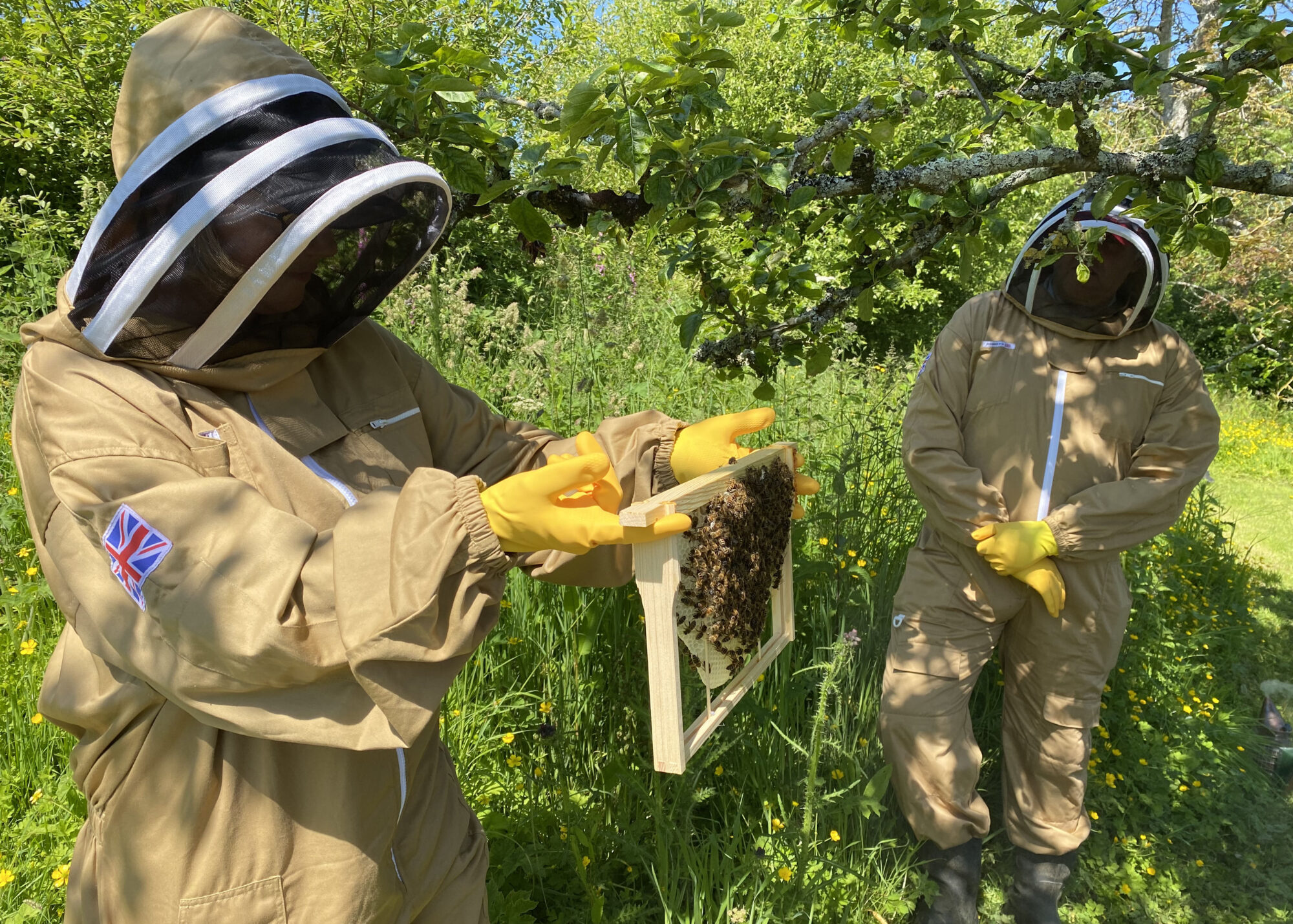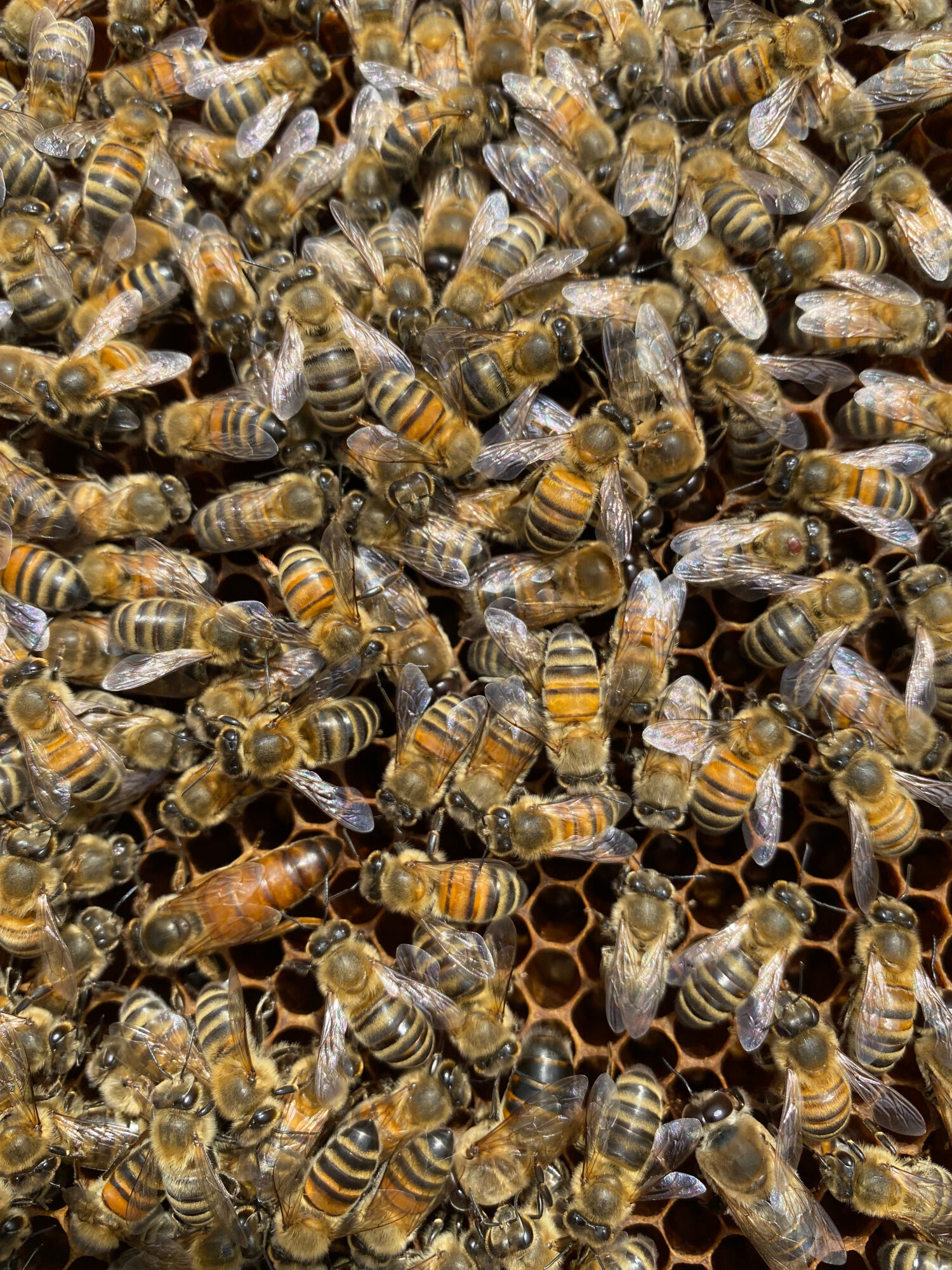
Thursday 1 February 7pm
Entry donation: £12
Donations will all go to wildlife conservation charities.
Hot supper, drinks and snacks available over the bar from 6pm.
Please phone 01308 459511 to reserve your seat now
Connecting People to Nature through Bees
Honeybees remain wild animals however much people impose on them or however close they choose to live to us. This talk will introduce you to a connection to wild nature that you may not have considered. Gareth Flux and Helen Bolter-Griffin will tell you about bees and bee behaviour, their work with people through social prescriptions and how their approach also guides them in our educational work with young people. It is introducing them to our bees that enables us to also teach them about the importance of looking after our shared habitat for both them and us.
Honeybees are emblematic of a cooperative society and their image and reputation is used across cultures to represent nature, honesty and purity.
Culturally, people generally like bees, or the concept of them, even if they have a learnt fear of them. This cultural feeling is well founded, honeybees have been eusocial insects for millions of years (the highest level of sociability) and so human beings have had a relationship with honeybees throughout our existence.
This relationship continues today and those people lucky enough to be able to interact regularly with bees know how rewarding this relationship is, which in part is a philosophical consideration of our place in nature.
Gareth Flux and Helen Bolter-Griffin are two beekeeper friends with a passion for educating people about honeybees. They recognise the privilege in their daily contact with honeybees. ‘Our desire is to share this privilege with people, to introduce them to the joy, tranquillity, and the fascinatingly complex behaviours of honeybees.’
‘It can be much deeper than this though, honeybees aren’t just fascinating, they are calming and offer fabulous wellbeing benefits that have helped both of us through difficult periods of our lives. They now give us the opportunity to help others not just by seeing these incredible insects up close, but also finding a connection with nature and with other people.’
Most people are unable to have their own colony of bees, but the Dorset Bee can provide the means for them to share this privilege through Green Social Prescribing which specifically supports people to connect with nature-based activities.
Social prescribing works for a wide range of people and the GP based social prescribing team will identify those that they think will benefit from bee experiences. This may be people that have one or more long-term conditions, need support with their mental health, are lonely or isolated or have complex social needs which affect their wellbeing.
Gareth and Helen practice an approach to bees that is considerate of their needs and seeks to minimise disruption and stress. This allows the bees to express their natural behaviours, and for those they introduce to the bees to enjoy a calm and peaceful interaction. Observing and being with honeybees is a wonderful route to mindfulness and provides not just a calming moment but a broader meditative benefit.
Please call 01308 459511 to reserve your seats. Numbers are limited and reservations will be essential.

The HOP talks are part of an initiative aiming to inspire and inform individuals, families and local communities with tangible actions to help combat the effects of climate change and environmental degradation, and to raise money for charities working in these areas. Each month the charity is chosen by the speaker. The project was initiated by Philip Howse OBE (Professor Emeritus, University of Southampton) with Professor Sir Ghillean Prance FRS VMH (former Director of the Royal Botanic Gardens, Kew) and the late James Lovelock CBE. Patrons include: George Monbiot, Clive Farrell, Dr George McGavin and Dr Kate Rawles.
Please join us and help our planet.
Sladers Yard
West Bay Road
West Bay, Bridport
Dorset DT6 4EL
gallery@sladersyard.co.uk
Tel. 01308 459511
© Sladers Yard 2024
Café Sladers
Licensed Restaurant
Events
Information
Weddings and Parties
café@sladersyard.co.uk
Site by FER
Sladers Yard
West Bay Road
West Bay, Bridport
Dorset DT6 4EL
gallery@sladersyard.co.uk
Tel. 01308 459511
Café Sladers
Licensed Restaurant
Events
Information
Weddings and Parties
café@sladersyard.co.uk
© Sladers Yard 2024. Site by FER.
We use cookies on this website. We use them to give you the best experience. If you continue using our website, we’ll assume that you are happy to receive all cookies on this website.